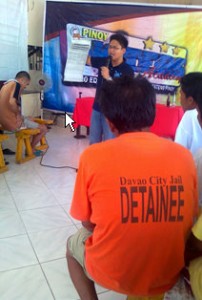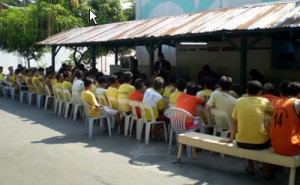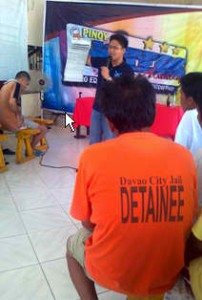By DUKE THOMAS G. DOLORICAL
Task Force 2010
 “EVEN if you make us vote, if we don’t know whom to vote for, it’s as if we are still wasting our vote.”
“EVEN if you make us vote, if we don’t know whom to vote for, it’s as if we are still wasting our vote.”
So lamented detainee Gemma Talingting at a recent voter education seminar conducted by the Simbahang Lingkod ng Bayan (SLB) at the Davao City Female Jail.
The Church-based organization has been holding these seminars in detention facilities throughout the country.
On May 10, Talingting is just one of the 23, 657 registered detainee voters who will be allowed to vote for the first time since democracy was restored in this country in 1986. About 95 percent of the detainees still awaiting conviction and still retain their right to vote.
Qualified prisoners were able to register through satellite registration facilities set up by the Commission on Elections through the cooperation of the Bureau of Jail Management and Penology (BJMP).
But Talingting said: “Even if we, the detainees, are taught the step-by-step process on how to vote and the proper values to use in choosing the most capable and competent of candidates, if we do not know who the candidates are, then it would seem that we may never be able to make wiser choices on the day of elections.”
Detainees have complained about the lack of voter education to inform them about the new automated election system (AES) and the candidates’ profiles and platforms of government.
They said they want to know who among the candidates have platforms on illegal drugs–most of their cases are drug-related–and the penal system as a whole.
To date, Task Force 2010, through the SLB, has conducted voter education seminars in various detention facilities in Mindanao and Luzon, which house majority of the registered detainee voters.
Task Force 2010 is a consortium of 19 electoral watchdogs working for the enfranchisement of the seven vulnerable sectors in the country’s electoral process: detainee voters, elderly, indigenous people, internally displaced, overseas absentee voters, first-time voters, and persons with disability.
The seminars discussed the AES, the right of suffrage as a human right, and how to properly choose the right candidates. They were facilitated by Jesuit teachers and SLB lay staff in coordination with BJMP Chief Gen. Rosendo Dial and with the support of the International Foundation for Electoral Systems (IFES) and the British Embassy.
 Seminars were held at the Antipolo City Jail (March 22), Davao City Jail Male and Female Facilities (March 23), Tagum City Jail Male and Female Facilities, Makati City Jail and Pasig City Jail (March 24), Quezon City Jail Male Facility and San Juan City Jail Male Facility (March 25), and Rodriguez Municipal Jail and Cainta City Jail (March 26).
Seminars were held at the Antipolo City Jail (March 22), Davao City Jail Male and Female Facilities (March 23), Tagum City Jail Male and Female Facilities, Makati City Jail and Pasig City Jail (March 24), Quezon City Jail Male Facility and San Juan City Jail Male Facility (March 25), and Rodriguez Municipal Jail and Cainta City Jail (March 26).
Task Force 2010 has been working closely with the Technical Working Group (TWG) for Detainee Voting, composed of the Commission on Human Rights, Commission on Elections, PRESO Foundation and the BJMP.
Last March 30, the Comelec adopted Resolution No. 8811 or the rules on detainee voting.
A major legal issue affecting the detainees’ right to electoral participation is access to polling places. Section 155 of the Omnibus Election Code prohibits the setting up of polling places inside prison compounds.
To address this problem, the Comelec granted the CHR’s petition to establish special polling places in municipal, district, city and provincial jails with at least 100 voters. For detention facilities with less than 100 registered voters, the Comelec will allow prisoners to be escorted to their polling precincts to cast their ballots.
